Grey scoop - Study guides, Class notes & Summaries
Looking for the best study guides, study notes and summaries about Grey scoop? On this page you'll find 79 study documents about Grey scoop.
Page 3 out of 79 results
Sort by
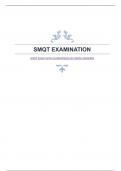
-
SMQT EXAM WITH GUARANTEED ACCURATE ANSWERS
- Exam (elaborations) • 6 pages • 2024
- Available in package deal
-
- $13.99
- + learn more
Food Service Regulation # - Accurate Answer800 to 814 Refrigerator temp and cold food - Accurate Answerunder 41 deg Hot Food - Accurate Answer135 degrees or higher Grey scoop - Accurate Answer#8. = 1/2 cup 145 degrees - Accurate AnswerCooking Temperature for: Fish, seafood, eggs, steak, pork 155 degrees - Accurate AnswerCooking Temperature for Ground meat 165 degrees - Accurate AnswerThe internal temp of turkey, chicken, duck Food Danger Zone - Accurate Answer41-135 pract...
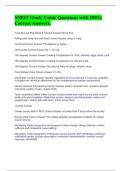
-
SMQT Study Guide Questions with 100% Correct Answers.
- Exam (elaborations) • 2 pages • 2023
- Available in package deal
-
- $10.49
- + learn more
Food Service Regulation # Correct Answer 800 to 814 Refrigerator temp and cold food Correct Answer under 41 deg Hot Food Correct Answer 135 degrees or higher Grey scoop Correct Answer #8. = 1/2 cup 145 degrees Correct Answer Cooking Temperature for: Fish, seafood, eggs, steak, pork 155 degrees Correct Answer Cooking Temperature for Ground meat 165 degrees Correct Answer The internal temp of turkey, chicken, duck Food Danger Zone Correct Answer 41-135 practicable Correct A...
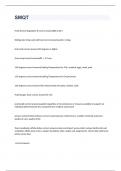
-
SMQT EXAM 2023 WITH LATEST UPDATE
- Exam (elaborations) • 3 pages • 2023
- Available in package deal
-
- $10.69
- + learn more
Food Service Regulation # 800 to 814 Refrigerator temp and cold food under 41 deg Hot Food 135 degrees or higher Grey scoop #8. = 1/2 cup 145 degrees Cooking Temperature for: Fish, seafood, eggs, steak, pork 155 degrees Cooking Temperature for Ground meat 165 degrees The internal temp of turkey, chicken, duck Food Danger Zone 41-135 practicable capable regardless of circumstances or resouces available to support an individual deter...
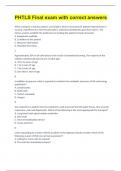
-
PHTLS Final exam with correct answers
- Exam (elaborations) • 11 pages • 2023
- Available in package deal
-
- $15.49
- + learn more
When caring for a trauma patient, a principle is what is necessary for patient improvement or survival. A preference is how the principle is achieved and depends upon four factors. The factors used to establish the preference in treating the patient include all except: A. Equipment available B. Condition of the patient C. Research information D. Situation that exists C Approximately 20% of all child abuse is the result of intentional burning. The majority of the children intentionally ...
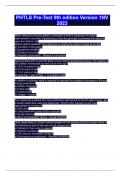
-
PHTLS Pre-Test 9th edition Version 1NV 2023
- Exam (elaborations) • 9 pages • 2023
-
- $11.99
- + learn more
When caring for a trauma patient, a principle is what is necessary for patient improvement or survival. A preference is how the principle is achieved and depends upon four factors. The factors used to establish the preference in treating the patient include all except: a) Condition of the patient b) Equipment available c) Situation that exists d) Research information - Research information Approximately 20% of all child abuse is the result of intentional burning. The majority of the chil...
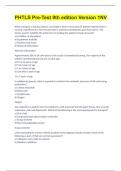
-
PHTLS Pre-Test 9th edition Version 1NV
- Exam (elaborations) • 11 pages • 2023
- Available in package deal
-
- $15.49
- + learn more
When caring for a trauma patient, a principle is what is necessary for patient improvement or survival. A preference is how the principle is achieved and depends upon four factors. The factors used to establish the preference in treating the patient include all except: a) Condition of the patient b) Equipment available c) Situation that exists d) Research information Research information Approximately 20% of all child abuse is the result of intentional burning. The majority of the chi...
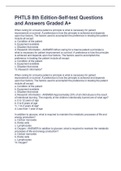
-
PHTLS 8th Edition-Self-test Questions and Answers Graded A+
- Exam (elaborations) • 15 pages • 2023
- Available in package deal
-
- $12.49
- + learn more
When caring for a trauma patient a principle is what is necessary for patient improvement or survival. A preference is how the principle is achieved and depends upon four factors. The factors used to accomplish the preference in treating the patient include all except: a. Condition of the patient b. Equipment available c. Situation that exists d. Research information - ANSWER-When caring for a trauma patient a principle is what is necessary for patient improvement or survival. A preferenc...
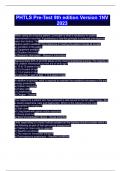
-
PHTLS Pre-Test 9th edition Version 1NV 2023
- Exam (elaborations) • 9 pages • 2023
- Available in package deal
-
- $10.99
- + learn more
When caring for a trauma patient, a principle is what is necessary for patient improvement or survival. A preference is how the principle is achieved and depends upon four factors. The factors used to establish the preference in treating the patient include all except: a) Condition of the patient b) Equipment available c) Situation that exists d) Research information - Research information Approximately 20% of all child abuse is the result of intentional burning. The majority of the chil...
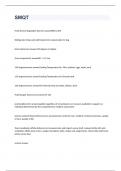
-
SMQT exam questions with correct answers
- Exam (elaborations) • 3 pages • 2023
-
- $12.99
- + learn more
Food Service Regulation # 800 to 814 Refrigerator temp and cold food under 41 deg Hot Food 135 degrees or higher Grey scoop #8. = 1/2 cup 145 degrees Cooking Temperature for: Fish, seafood, eggs, steak, pork 155 degrees Cooking Temperature for Ground meat 165 degrees The internal temp of turkey, chicken, duck Food Danger Zone 41-135 practicable capable regardless of circumstances or resouces available to support an individual deter...
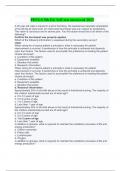
-
PHTLS 9th Ed. Self-test answered 2022
- Exam (elaborations) • 14 pages • 2024
-
- $11.99
- + learn more
PHTLS 9th Ed. Self-test answered 2022 A 30 year old male is injured in a terror bombing. He experiences traumatic amputation of his left leg at knee level. An improvised tourniquet was put in place by bystanders. The victim is conscious and in severe pain. You first action should be to do which of the following? Confirm the tourniquet was properly applied. Which of the following information is assessed during the secondary survey? vitals When caring for a trauma patient a principle is wha...

$6.50 for your textbook summary multiplied by 100 fellow students... Do the math: that's a lot of money! Don't be a thief of your own wallet and start uploading yours now. Discover all about earning on Stuvia


